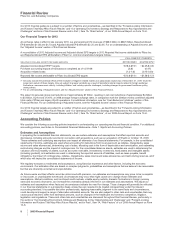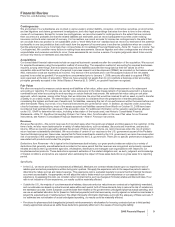Pfizer 2009 Annual Report Download - page 19
Download and view the complete annual report
Please find page 19 of the 2009 Pfizer annual report below. You can navigate through the pages in the report by either clicking on the pages listed below, or by using the keyword search tool below to find specific information within the annual report.
Financial Review
Pfizer Inc. and Subsidiary Companies
•an adjustment to the prior years’ liabilities for product returns of $217 million recorded in the third quarter of 2008.
In 2009, Lipitor, Lyrica and Celebrex each delivered at least $2 billion in revenues, while Norvasc, Viagra, Xalatan/Xalacom, Detrol/
Detrol LA, Zyvox and Geodon/Zeldox each surpassed $1 billion in revenues. In 2009, we did not record more than $1 billion in
revenues for any individual legacy Wyeth product since the Wyeth acquisition date of October 15, 2009.
In 2008, Lipitor, Norvasc (which lost U.S. exclusivity in March 2007), Lyrica and Celebrex each delivered at least $2 billion in
revenues, while Geodon/Zeldox, Zyvox, Viagra, Detrol/Detrol LA and Xalatan/Xalacom each surpassed $1 billion in revenues.
In 2007, Lipitor, Norvasc (which lost U.S. exclusivity in March 2007) and Celebrex each delivered at least $2 billion in revenues,
while Lyrica, Viagra, Detrol/Detrol LA , Xalatan/Xalacom and Zyrtec/Zyrtec D (which lost U.S. exclusivity in January 2008) each
surpassed $1 billion in revenues.
Revenues exceeded $500 million in each of 13 countries outside the U.S. in 2009; in each of 14 countries outside the U.S. in 2008
and in each of 12 countries outside the U.S. in 2007. The decrease in the number of countries outside the U.S. in which revenues
exceeded $500 million in 2009 was due to the unfavorable impact of foreign exchange. The U.S. was the only country to contribute
more than 10% of total revenues in each year.
Our policy relating to the supply of pharmaceutical inventory at domestic wholesalers, and in major international markets, is to
generally maintain stocking levels under one month on average and to keep monthly levels consistent from year to year based on
patterns of utilization. We historically have been able to closely monitor these customer stocking levels by purchasing information
from our customers directly or by obtaining other third-party information. We believe our data sources to be directionally reliable but
cannot verify their accuracy. Further, as we do not control this third-party data, we cannot be assured of continuing access. Unusual
buying patterns and utilization are promptly investigated.
Rebates and chargebacks reduced revenues, as follows:
YEAR ENDED DECEMBER 31,
(BILLIONS OF DOLLARS) 2009 2008 2007
Medicaid and related state program rebates(a) $0.7 $0.5 $0.6
Medicare rebates(a) 0.9 0.8 0.4
Performance-based contract rebates(a), (b) 2.3 2.1 2.0
Chargebacks(c) 2.3 1.9 1.6
Total $6.2 $5.3 $4.6
(a) Rebates are product-specific and, therefore, for any given year are impacted by the mix of products sold.
(b) Performance-based contracts are with managed care customers, including health maintenance organizations and pharmacy benefit managers, who
receive rebates based on the achievement of contracted performance terms for products.
(c) Chargebacks primarily represent reimbursements to wholesalers for honoring contracted prices to third parties.
The above rebates and chargebacks for 2009 were higher than 2008, primarily as a result of:
•the impact of increased rebate rates and higher sales for certain products that are subject to rebates, as well as certain contractual
changes that have resulted in increased rebates; and
•the impact of higher sales by our Greenstone subsidiary of generic products that are subject to chargebacks and increased competitive
pricing factors,
partially offset by:
•changes in product mix, among other factors.
Our accruals for Medicaid rebates, Medicare rebates, performance-based contract rebates and chargebacks were $2.1 billion as of
December 31, 2009, and primarily are all included in Current deferred tax liabilities and other current liabilities.
Revenues by Business Segment
Effective with the acquisition of Wyeth, we operate in the following two distinct commercial organizations, which constitute our two
business segments:
•Biopharmaceutical consists of the Primary Care, Specialty Care, Oncology, Established Products and Emerging Markets customer-
focused units and includes products that prevent and treat cardiovascular and metabolic diseases, central nervous system disorders,
arthritis and pain, infectious and respiratory diseases, urogenital conditions, cancer, eye disease and endocrine disorders, among
others. Biopharmaceutical’s segment profit includes costs related to research and development, manufacturing, and sales and
marketing activities that are associated with the products in our Biopharmaceutical segment.
•Diversified includes animal health products that prevent and treat diseases in livestock and companion animals, including vaccines,
parasiticides and anti-infectives; consumer healthcare products that include over-the-counter healthcare products such as pain
management therapies (analgesics and heat wraps), cough/cold/allergy remedies, dietary supplements, hemorrhoidal care and
personal care items; nutrition products such as infant and toddler nutritional products; and Capsugel, which represents our gelatin
capsule products and services business. Diversified’s segment profit includes costs related to our research and development,
manufacturing, and sales and marketing activities that are associated with the products in our Diversified segment.
2009 Financial Report 17
























